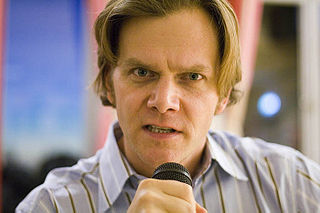A Quote by Clarissa Pinkola Estes
Writing, real writing, should leave a small sweet bruise somewhere on the writer . . . and on the reader.
Related Quotes
How often I have tried to tell writing students that the first thing a writer must do is love the reader and wish the reader well. The writer must trust the reader to be at least as intelligent as he is. Only in such well wishing and trust, only when the writer feels he is writing a letter to a good friend, only then will the magic happen.
I don't think that writing, real writing, has much to do with affirming belief--if anything it causes rifts and gaps in belief which make belief more complex and more textured, more real. Good writing unsettles, destroys both the author and the reader. From my perspective, there always has to be a tension between the writer and the monolithic elements of the culture, such as religion.
Simply put, meta-writing is writing that is self-conscious, self-reflective, and aware of itself as an artifice. The writer is aware she's writing, and she's aware there's a reader, which goes all the way back to Montaigne's often-used address "dear reader," or his brief introduction to Essais: "To the Reader." It can be done in a myriad of ways.
The poem is not, as someone put it, deflective of entry. But the real question is, 'What happens to the reader once he or she gets inside the poem?' That's the real question for me, is getting the reader into the poem and then taking the reader somewhere, because I think of poetry as a kind of form of travel writing.
There's an old adage in writing: 'Don't tell, but show.' Writing is not psychology. We do not talk 'about' feelings. Instead the writer feels and through her words awakens those feelings in the reader. The writer takes the reader's hand and guides him through the valley of sorrow and joy without ever having to mention those words.
If a writer of prose knows enough about what he is writing about he may omit things that he knows and the reader, if the writer is writing truly enough, will have a feeling of those things as strongly as though the writer had stated them. The dignity of movement of an iceberg is due to only one-eighth of it being above water. A writer who omits things because he does not know them only makes hollow places in his writing.
Good writing, and this is especially important in a subject such as economics, must also involve the reader in the matter at hand. It is not enough to explain. The images that are in the mind of the writer must be made to reappear in the mind of the reader, and it is the absence of this ability that causes much economic writing to be condemned, quite properly, as abstract.
When writing goes painfully, when it’s hideously difficult, and one feels real despair (ah, the despair, silly as it is, is real!)–then naturally one ought to continue with the work; it would be cowardly to retreat. But when writing goes smoothly–why then one certainly should keep on working, since it would be stupid to stop. Consequently one is always writing or should be writing.
Writing objects to the lie that life is small. Writing is a cell of energy. Writing defines itself. Writing draws its viewer in for longer than an instant. Writing exhibits boldness. Writing restores power to exalt, unnerve, shock, and transform us. Writing does not imitate life, it anticipates life.
I don't think you could teach someone to be a genius, but you can certainly teach them to not make rookie mistakes and to look at writing the way a writer looks at writing, and not just the way a reader looks at writing. There are a lot of techniques and skills that can be taught that will be helpful to anybody, no matter how gifted they are, and I think writing programs can be very good for people.
The writer trusts nothing she writes-it should be too reckless and alive for that, it should be beautiful and menacing and slightly out of control. . . . Good writing . . . explodes in the reader's face. Whenever the writer writes, it's always three or four or five o'clock in the morning in her head.
That underscored this idea that when we're reading a book or writing a book, you're in an act of co-creation. The reader and the writer are both trying to dress up and present their best selves and then there's that moment, when suddenly, as a reader, you're not exactly you anymore, and likewise, as a writer, you're not really you.







































